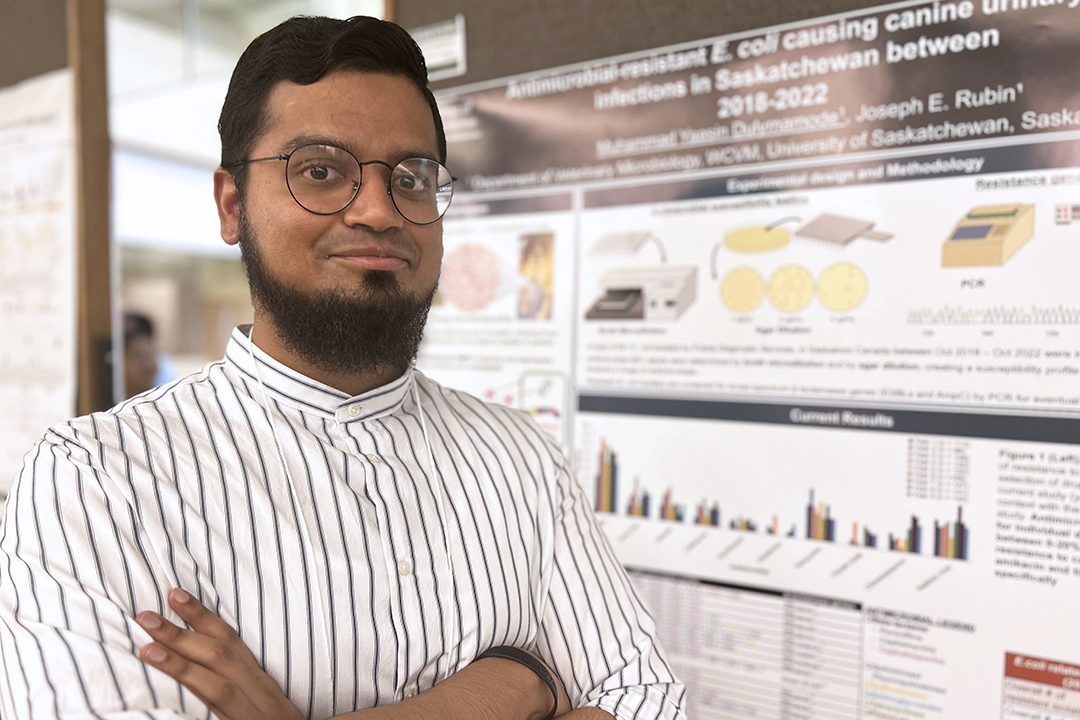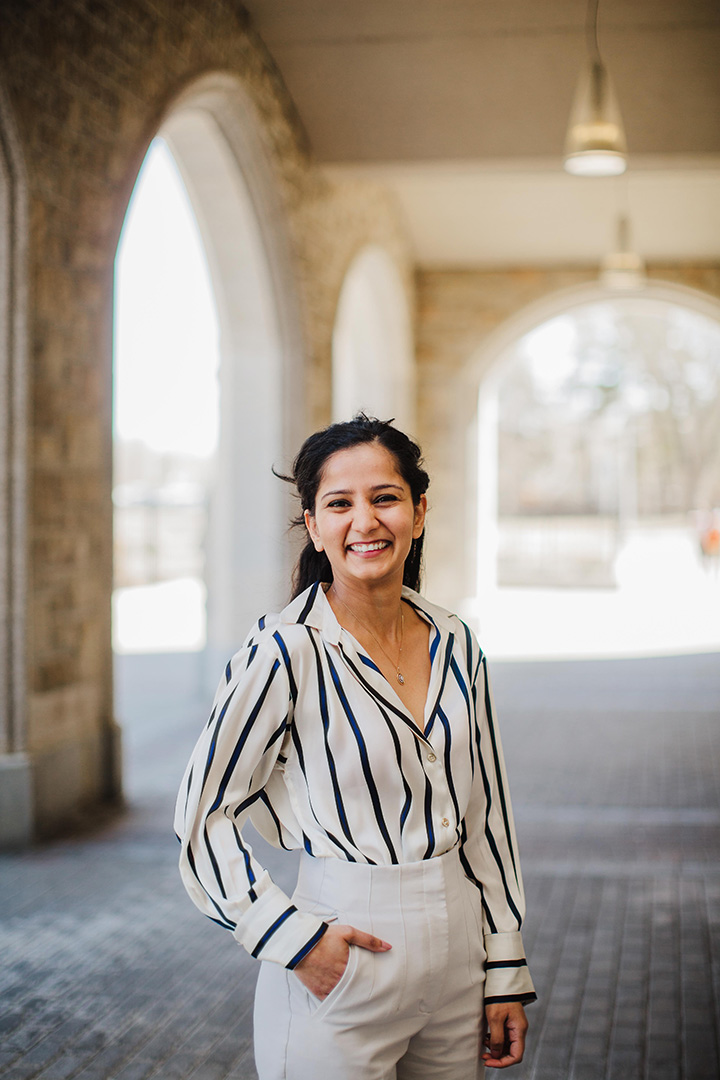
WCVM researchers earn awards at USask Life and Health Sciences Research Expo
Members of the Western College of Veterinary Medicine’s (WCVM) research community earned awards for their showings at the University of Saskatchewan (USask) 2023 Life and Health Sciences Research Expo on May 4.
By Cat ZensMembers of the Western College of Veterinary Medicine’s (WCVM) research community earned awards for their scholarly work at the University of Saskatchewan (USask) 2023 Life and Health Sciences Research Expo on May 4.
The annual event, now in its 30th year, showcases interdisciplinary health science research work done on the USask campus and throughout the province.
This year’s 86 participants, including 21 WCVM researchers, gathered in the university’s Health Sciences Building and presented their research posters to USask students, faculty, staff and others on campus. The research poster presentation competition had three categories: basic science, transitional clinical or applied science, and social and population health.
A panel of judges from various research backgrounds graded the participants’ work, and based on the judges’ scores, cash prizes were given to first- and second-place winners in each category.
In addition to students winning in the research poster presentation competition, organizers presented awards for “Best Research Paper” in the three categories as well as an overall “Best Supervisor” award. In total, award recipients received over $5,000 in prize money during the event’s awards ceremony.
Dr. Poonam Dhindwal (PhD), a postdoctoral fellow in the WCVM’s Department of Veterinary Microbiology, earned the best research paper prize in the basic science category. Her paper, “A neglected and emerging antimicrobial resistance gene encodes for a serine-dependent macrolide esterase,” was published in the Proceedings of the National Academy of Sciences earlier this year.

The research paper reported on the discovery of an antimicrobial resistance gene (ARG) that is capable of inactivating antibiotic drugs typically used for disease prevention in beef cattle and other livestock.
Dhindwal notes that the gene’s discovery has a direct impact on future antimicrobial research and how antibiotic drugs are given to food animals.
"It's mostly important for veterinary doctors because if they are aware of this [antimicrobial resistance] gene and it's common, they can actually give a different drug that's probably not affected by this gene, " Dhindwal says.
In addition to enriching the antimicrobial gene library (AMR), Dhindwal’s findings will be used to determine other homologous enzymes (similar-structured enzymes) that are not annotated yet and how they affect other commonly prescribed antibiotics.
The following list includes all WCVM winners in the different categories at the 2023 USask Life and Health Sciences Research Expo.
BEST RESEARCH PAPER
Best research paper (basic science category)
Poonam Dhindwal, Department of Veterinary Microbiology, WCVM
Supervisor: Dr. Tony Ruzzini (WCVM)
RESEARCH POSTERS
Basic Science 1
First place: Cameron Morse, Department of Veterinary Biomedical Sciences, WCVM
Poster title: "Effects of exercise on cerebral perfusion and neurogenesis in a rodent model of heart failure."
Supervisors: Drs. Dylan Olver (WCVM) and Corey Tomczak (USask College of Kinesiology)
This study aims to analyze the effects of exercise training (EX) in treating cerebral hypoperfusion (decreased blood pressure) in individuals with heart failure suffering from cardiogenic dementia. This study determines if EX improves cerebral perfusion (what drives blood flow to the brain) and neurogenesis (a process in which new neurons form in the brain) in rats.
Second place: Marina Carla Bezerra da Silva, Department of Veterinary Pathology, WCVM
Poster title: "Is reproductive histopathology of honey bee drones useful for ecotoxicological risk assessment?"
Supervisors: Drs. Sarah Wood and Elemir Simko (WCVM)
Although histopathology (the microscopic study of diseased cells) is used in animals to assess gonadotoxic (destroying sperm and eggs) risks of new compounds, it’s not used to analyze contaminants in honey bees. This study uses histopathology to evaluate the effects of in vitro pupae exposure to the gonadotoxic compound amitraz on honey bee testicular development.
Basic Science 4
First place: Narsimha Pujari, Department of Veterinary Biomedical Sciences, WCVM
Poster title: "Feeding response in mated drosophila females is regulated by NUCB1's expression in the nervous system."
Supervisor: Dr. Adelaine Leung (WCVM)
Summary: In fruit flies, the sex peptide (SP) transfers from the male to female during sexual intercourse. The SP initiates post-mating responses (PMR) in female flies, which increases food intake. As observed in mammals, a protein called nucleobinden-1 (dNUCB1) has anti-hunger properties. This study evaluates if dNUCB1 is involved in post-mating food intake increases in female flies.
Basic Science 5
Second place: Victoria Gonzalez, Department of Veterinary Microbiology, WCVM
Poster title: "Investigating antiviral type 1 interferon responses in bats using recombinant IFNβ."
Supervisor: Dr. Arinjay Banerjee (WCVM/VIDO)
Summary: Bats host viruses that can cause severe human diseases, like SARS-CoV-2. But infected bats do not show clinical signs of illness. Interferons (IFNs) are mammals' first line of defence against invading viruses. Type 1 IFNS, like INFB, induce viral infection to protect infected and neighbouring cells by interferon-stimulated genes (ISGs.) This study evaluates if bat cells mount a more robust type 1 IFN response to SARS-CoV-2 than human cells.
Translational, Clinical or Applied Science 1
First place: Hemlata Gautam, Department of Veterinary Pathology, WCVM
Poster title: "Induction of immune response against necrotic enteritis by a single intrapulmonary live clostridium perfringens vaccine at hatch to protect broiler chickens."
Supervisor: Dr. Susantha Gomis (WCVM)
Summary: Amid a dramatic increase in chicken production, mandated limits on the use of antibiotics of human importance in Canadian broiler production led to an increase in infections of necrotic enteritis (NE). NE is caused by Clostridium perfringens (CP) — a bacterium known to cause food poisoning. This study aims to develop a novel vaccination strategy against NE by modulation of the immune system of broiler chicken embryos. This is to prevent human illnesses caused by contaminated poultry meat due to NE.
Translational, Clinical or Applied Science 2
Second place: Fatima Masood, Department of Veterinary Pathology, WCVM
Poster title: "Antimicrobial resistance and genomic characterization of North American Melissococcus plutonius isolates."
Supervisors: Drs. Antonio Ruzzini and Sarah Wood (WCVM)
Summary: Melissococcus plutonius is a bacterial pathogen of honey bee larvae that causes European foulbrood (EFB) disease. Antimicrobials are generally used to treat EFB. However, it’s suspected that antimicrobial resistance (AMR) is evident where North American bees reside. Little is known about the resistance profiles of M. plutonius and their relationship with drugs meant for clearing infections in honey bee larvae. This study determines the AMR profiles of North American M. plutonius isolates through minimum inhibitory concentration (MIC) determination.
Translational, Clinical or Applied Science 3
Second place: Yaasin Dulymamode, Department of Veterinary Microbiology, WCVM
Poster title: "Antimicrobial resistance surveillance of E. coli causing canine UTIs in Saskatchewan, between 2018 and 2022."
Supervisor: Dr. Joe Rubin (WCVM)
Summary: Amid a global rise of antimicrobial resistance, this study aims to analyze antimicrobial susceptibility profiles and the epidemiology of resistance genes of E. coli isolates in dogs— given that E. coli is the most common cause of urinary infections in dogs. This study will specifically analyze data from Oct. 2018 to Oct. 2022.
ADDITIONAL RESEARCH AWARDS
Interdisciplinary/Interprofessional Collaboration (one of three recipients)
Recipient: Hemlata Gautam, Department of Veterinary Pathology, WCVM
Supervisor: Dr. Susantha Gomis (WCVM)
Cat Zens of North Battleford, Sask., is a fourth-year student in the University of Regina’s School of Journalism. She is working as a research communications intern at the Western College of Veterinary Medicine (WCVM) for summer 2023.
